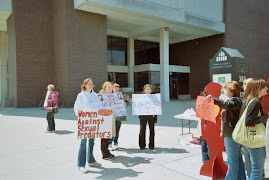Ban on molesters in parks is upheld
Ruling in Plainfield's case considered key for Indiana communities with similar rules
By Bruce C. Smith
Posted: September 25, 2008
Plainfield won a key court decision Wednesday in the fight over banning sex offenders from parks, a case closely watched by other Indiana cities and towns with similar bans.
Although courts struck down an Indianapolis ban two years ago, Plainfield's ordinance is the latest in a series of narrower measures to survive court challenges. Lafayette and Michigan City enacted bans against individual sex offenders that have withstood court review.
Greenwood enacted a ban similar to Plainfield's two years ago, and a suit over the constitutionality of that ordinance has been on hold pending the outcome of the Plainfield case. Another suit is pending concerning a ban in Jeffersonville.
The Indianapolis ordinance prohibited convicted sex offenders within 1,000 feet of a park or school. A federal judge found the ordinance overly broad, noting there were few places in the city that were not within 1,000 feet of a park, a school, a playground or other children's gathering spot.
Indianapolis officials chose not to appeal the ruling, and the City-County Council has not discussed trying to draw up a new version that might survive in the courts.
On Wednesday, the appeals court, in a unanimous ruling, said that while Plainfield's ban does have a punitive aspect, the ordinance did not violate guarantees to the rights of life, liberty and the pursuit of happiness under the Indiana Constitution. The ruling upholds a March decision by Hendricks Superior Court Judge Robert Freese in favor of Plainfield.
The American Civil Liberties Union of Indiana filed suit in November 2005 on behalf of a Marion County man identified only as John Doe, claiming Plainfield's ordinance was unconstitutional on several grounds.
The ACLU had argued that enjoyment of the parks is a core value under the Indiana Constitution, and that banishment from the parks is a second punishment for a crime.
"Obviously we're disappointed because we felt this ordinance is impinging on constitutional rights," said ACLU Legal Director Kenneth J. Falk.
A decision on whether to appeal to the Indiana Supreme Court will be made within a few days, he said.
Town officials praised the ruling.
"We're pleased with the outcome and a 3-0 vote by the court," said Plainfield Town Attorney Mel Daniel. "We all know how very important the parks are in Plainfield, and how adamant the town is to keep them clean and safe for the kids."
Under Plainfield's ordinance, people listed publicly on the state registry of sex offenders are prohibited from going into town parks and recreational areas. People with convictions for such crimes as rape, child molesting and incest must register with the state.
The man identified as John Doe is a convicted sex offender who was released from probation in August 2004. According to the lawsuit, Doe and his son visited Plainfield parks until June 2005, when a policeman recognized him and knew he was on the state registry of sex offenders.
He told Doe the town ordinance bans anyone on the state's online registry of convicted sex offenders from being in the parks.
Doe sued Plainfield, setting off three years of twists and turns in the legal case. In one key development, Doe won a court ruling to keep his identity secret in the legal proceeding, even though he is listed publicly on the sex offender registry.
Hungry Wolves
-
This world really is sick and diluted with power hungry wolves who devour
any thing in their path.
As I look for the outcome of so many missing Childre...
3 years ago



No comments:
Post a Comment